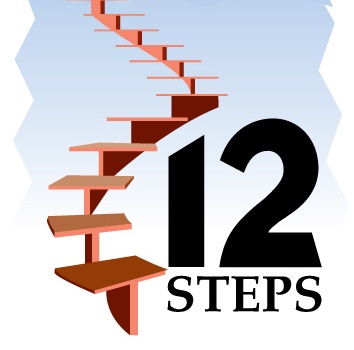
12 Steps on your way to sobriety
Alcoholics Anonymous is referred to as an International Fellowship with the primary purpose of assisting alcoholics achieve sobriety. The fellowship was founded in 1935 by Bill Wilson and Dr. Bob Smith; through the years it has aided the recovery of millions of alcoholics and its principles and ethos have been adopted in order to facilitate the recovery of other common addictions. The tools used within AA are known as the Twelve Steps and the Twelve Traditions. The Twelve Steps that we know to be part of the AA fellowship today are part of a process of evolution, experience and learning. They were first published by the founders in 1953 to share their eighteen years of experience within the fellowship and how it had encouraged the recovery of members.
The Twelve Steps are a group of principles, spiritual in their nature, which, if practiced as a way of life, can expel the obsession to drink and enable the sufferer to become happily and usefully whole.
The Twelve Steps:
- We admitted we were powerless over alcohol – that our lives had become unmanageable.
Obviously this is the first and most important step in working towards a life of sobriety, if you cannot recognise that there is a problem and that your life is being negatively impacted upon, then you can in no way attempt to work the remaining steps or attempt to get sober. The time comes to admit defeat and hold your hands up to your mistakes.
- Came to believe that a Power greater than ourselves could restore us to sanity.
This step is challenging, after the admission of powerlessness, the individual then has to also accept that there is a power beyond their control capable of resolving the issues they face. There is also an issue with faith, religion and spirituality- some may not have any of these as part of their lives. It is important to understand that the steps are not rules, they are suggestions. You can take the time necessary to understand and determine what a higher power is to you and how to work this step on a personal level.
- Made a decision to turn our will and our lives over to the care of God as we understood Him.
Only once you have come to accept step two and embrace it on your road to recovery, can you go on to genuinely work step three . There is a difference in the previous steps- they asked only for acceptance, but step three requires action. You need to let God/ Higher Power in and relinquish control and you need to determine how you are going to do this, faith and belief alone are not enough.
- Made a searching and fearless moral inventory of ourselves.
This step asks you to look honestly and deeply within yourself in order to determine your failings, shortcomings and liabilities. In doing this we can see clearly what has led us to this point, what has shaped us, affected us and essentially warped us. Again it is about recognition, if we do not recognize these liabilities we cannot move forward to correct them and they will continue to rule our life and damage our recovery.
- Admitted to God, to ourselves, and to another human being the exact nature of our wrongs.
This is one of the most challenging steps for a fellowship member to carry out. It can prove to be extremely damaging to the ego and self-centred life they have been living. Many also fail in this step as they pick and choose their admissions, ignoring the realities that may have caused the most damage not alone to others but to themselves. Admission of wrong doings needs to be done whole heartedly, completely and honestly, without applying blame to others. We all must confess our own sins.
- Were entirely ready to have God remove all these defects of character.
As an AA member this is a hugely significant step and requires you to admit you have been unable to overcome your defects and that up to this point the methods you have chosen have not worked. We give ourselves to God’s will and release ourselves from our obsession.
- Humbly asked Him to remove our shortcomings.
This step refers to humility and without achieving some degree of humility an alcoholic cannot remain sober or become truly happy. Through humility A.A’s can achieve priceless learning and obtain assets never before considered through the experience of their failures and misery.
- Made a list of all persons we had harmed and became willing to make amends to them all.
This is the first of two steps concerned with personal relations. Through the previous steps we can recognize that we have done damage while drinking, we understand that our drinking has caused damage not only to ourselves but to those around us. This step asks that we look at what we have done wrong, who we have wronged and to do all in our power to improve our relationships with every human being we know.
- Made direct amends to such people wherever possible, except when to do so would injure them or others.
There are considerations and qualities essential in taking step nine. One must exercise good judgement, timing, prudence and courage. This step is more complex than it may seem, in taking it we cannot be self-serving, selfish or indulgent. The purpose is to make amends and rectify the wrongs that have been done to those around us.
- Continued to take personal inventory and when we were wrong promptly admitted it.
This step is a reminder that this is a continuous process and the road to sobriety is never ending. We need to assess our sobriety regularly, are we doing what’s necessary to stay sober or are we jeopardizing our sobriety. We must maintain emotional balance and work to secure it regardless of our life’s conditions. Through taking stock of our personal life and making peace with ourselves we are better equipped to face life’s challenges as they come.
- Sought through prayer and meditation to improve our conscious contact with God as we understood Him, praying only for knowledge of His will for us and the power to carry that out.
Step eleven reminds A.A’s that we need to have willingness to hand things over to a Higher Power. It is also a reminder that we need to maintain a conscious contact with God in order to secure an unshakeable foundation for life. Meditation and prayer are directly linked to self-examination and the ability to have genuine self-awareness. Through releasing yourself into God’s will you can truly be at peace.
- Having had a spiritual awakening as the result of these steps, we tried to carry this message to alcoholics and practice these principles in all our affairs.
Step twelve encompasses all steps within the programme; it is only when A.A.’s embrace the steps and practice them as part of daily life that emotional sobriety can be achieved. This new way of living also leads to spiritual awakening and develops an emotional intelligence and self-awareness that allows us to accept the gifts that come with our new found sobriety. This allows us to pass on our understanding to other alcoholics and gives us the capabilities to guide them on their journey.
The Twelve Traditions apply to the life of the Fellowship itself. They outline the means by which A.A. maintains its unity and relates itself to the world about it, the way it lives and grows.
The twelve traditions are the guiding principles of AA which underpin its functioning. The twelve steps offer focus and understanding of what the fellowship is about, how it works and what it works to achieve. As with the twelve steps, the traditions have developed and been informed by the experiences and learning of those within the fellowship. All organisations need rules and regulations in order to function effectively, Alcoholics Anonymous is no different. The long-time survival of AA can be attributed to the traditions which have guided it for the past 80 years.
The Twelve Traditions:
- Our common welfare should come first; personal recovery depends upon AA unity.
- For our group purpose there is but one ultimate authority – a loving God as He may express Himself in our group conscience.
Our leaders are but trusted servants; they do not govern. - The only requirement for AA membership is a desire to stop drinking.
- Each group should be autonomous except in matters affecting other groups or AA as a whole.
- Each group has but one primary purpose-to carry its message to the alcoholic who still suffers.
- An AA group ought never endorse, finance or lend the AA name to any related facility or outside enterprise, lest problems of money, property and prestige divert us from our primary purpose.
- Every AA group ought to be fully self-supporting, declining outside contributions.
- Alcoholics Anonymous should remain forever nonprofessional, but our service centers may employ special workers.
- AA, as such, ought never be organized; but we may create service boards or committees directly responsible to those they serve
- Alcoholics Anonymous has no opinion on outside issues; hence the AA name ought never be drawn into public controversy.
- Our public relations policy is based on attraction rather than promotion; we need always maintain personal anonymity at the level of press, radio and films.
- Anonymity is the spiritual foundation of all our traditions, ever reminding us to place principles before personalities.
The twelve step program within AA offers a course of action for those wishing to end their drinking and become sober. Through joining AA people have the benefit of being part of something; an entity with the knowledge, experience and support necessary to achieve long lasting emotional sobriety.
The only requirement to join AA is the desire to stop drinking.
Sources:
http://www.aa.org/pages/en_US/twelve-steps-and-twelve-traditions





